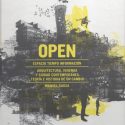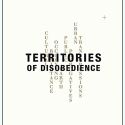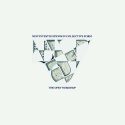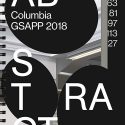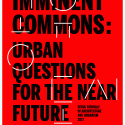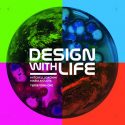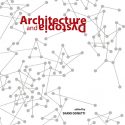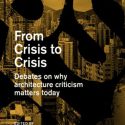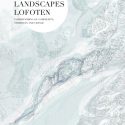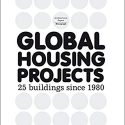Territories of Disobedience (ENG ED.)
New Investigations in Collective Form
Abstract 2018
Imminent Commons Compendium (4 vol)
Seoul Biennale of Architecture and Urbanism 2017 (4 volumes) Alejandro Zaera- Polo, Hyungmin Pai and others
This compendium assembles 4 volumes that explore city commons through the works presented at the Seoul Biennale 2017. The first book shows an exploration not of distant utopias, but of the very near future, because the emerging commons is changing the way we connect, make, move, recycle, sense, and share, and the way we manage air, water, energy and the earth. The second book presents contemporary urbanism thoughts on nine imminent commons, which engage collective ecological and technological resources relevant to all cities and even extra-urban territories. The third book sets up a dialogue on the current state and near future of cities of the world through the lens of public initiatives, projects, and urban narratives. The fourth book highlights Seoul’s complex urban fabric as a theatre on which the Seoul Biennale was played out.
4 Vol. inlcluded 9781945150517 IMMINENT COMMONS: URBAN QUESTIONS FOR THE NEAR FUTURE 9781945150647 IMMINENT COMMONS : THE EXPANDED CITY 9781945150661 IMMINENT COMMONS: COMMONING CITIES 9781945150920 IMMINENT COMMONS: LIVE FROM SEOULDesign with Life
In the challenging context of accelerating climate dynamics, the core discipline of architectural design is evolving and embracing new forms of action. New York-based nonprofit Terreform ONE has established a distinctive design tactic that investigates projects through the regenerative use of natural materials, science, and the emergent field of socio-ecological design. This kind of design approach uses actual living matter (not abstracted imitations of nature) to create new functional elements and spaces. These future-based actions are not only grounded in social justice, but are also far-reaching in their application of digital manufacturing and maker culture. Terreform ONE tackles urgent environmental and urban social concerns through the integrated use of living materials and organisms. Mitchell Joachim and Maria Aiolova, founders of Terreform ONE, describe their practice through various projects and prolific research that has made significant impact to what is increasingly recognized as socio-ecological design. Together they achieve an abundant collection of projects that validate these unique experimental methods, including the Monarch Sanctuary, a new urban building type to protect butterflies from extinction; Cricket Shelter and Farm, a series of modular volumes for harvesting alternate forms of insect protein; and biodegradable structures called Mycoform that invokes principles of synthetic biology to prototype 100% compostable furniture. Design with Life documents this growing body of work and outlines an original direction for a changing discipline, reviewing concepts at a range of scales for metropolitan areas. In an age where speed is everything, Terreform ONE reveals how future architecture and urban design practices can cultivate biological processes and create resilient answers to tomorrow's wicked problems.
EBOOK EDITIONArchitecture and Dystopia
As a response to the profound crisis of Western culture the emerged in the 1960s, radical artists from Italy, Austria, England and Japan called into question the foundations of modernist utopias. They transmuted the difficulties of capitalism into a repertory of startling images that revealed the disturbing realities of consumer society, even in those places still resistant to the penetration of modern architecture, such as Superstudio and Archizoom’s Florence. Their model, though exhausted in the space of experimentation, went on to inspire a generation of architects, from the High Tech movement to Rem Koolhaas, who sought to employ the paradigm of dystopia as both a visionary and a constructive method, one which could operate on the architecture of late capitalism and generate unexpected possibilities for urban planning. In the light of these examples, how to define a unified “dystopian” method of design, i.e. a common ground for an architecture that, by its very nature, seems to resist systematization? Are the most recognizable architectural expressions of this theoretical framework—characterized by brazen displays of technology and structures of overwhelming scale—merely isolated cases, albeit of particular iconic power? Or do they belong to a wider landscape of antirational architectural projects? And to what extent are these disturbing expressions premised on the utopian tradition or, better yet, the conceptual model of “negative thought”? The goal of this book is to respond to such questions, thus initiating an open dialogue about the legitimacy of this critical category.
EBOOK VERSIONFrom Crisis to Crisis
From Crisis to Crisis examines how reading, writing and criticism can address the urgent issues faced by architecture today, including: the role of the architect in the era of specialization; the function of criticism in diverse political, economic and cultural contexts; and, the possibility of architectural education to take on history, theory, civic engagement and political participation. Drawn from an international public symposium organized in the spring of 2017 by the University of Hong Kong (HKU) Department of Architecture, the book is comprised in equal parts of focused essays and transcripts of the wide-ranging discussions. From Crisis to Crisis reflects Hong Kong’s ongoing transformation from a gateway between China and the world, to a regional hub opening up a new milieu for the cultural, economic, and intellectual resources of Asia. The HKU Department of Architecture is part of this ongoing transformation, attracting thinkers from Asia, North America, Australia and Europe to engage in critical, relevant dialogues. The publication reflects this diversity and is characterized by its flexibility, contingency, vitality, and open-endedness.
With contributions of: Anthony Acciavatti, Chris Brisbin, Sony Devabhaktuni, Françoise Fromonot, Seng Kuan, Xiaoxuan Lu, Jonathan Massey, Graham Brenton Mckay, Kamran Afshar Naderi, Angelika Schnell, Eunice Seng, Nasrine Seraji, Zhi Wenjun, Tao ZhuLayered Landscapes Lofoten
Global Housing Projects
25 buildings since 1980 Josep Lluis Mateo
The world is merging into one global system of goods, people and information. This book explores the social, cultural, and economic phenomena of globalization through housing. The Chair of Architecture and Design at the ETH in Zurich examines the last 25 years of housing development. This book is a historical criticism with the built projects as protagonists. Housing typologies have been chosen as contemporary architectural prototypes. The selection of housing projects reflects the most innovative and influential built housing projects to propose new important guidelines in housing. EBOOK EDITION
